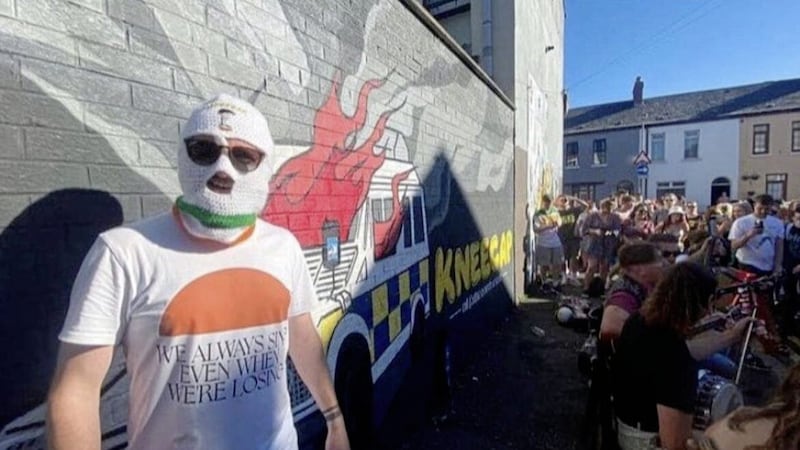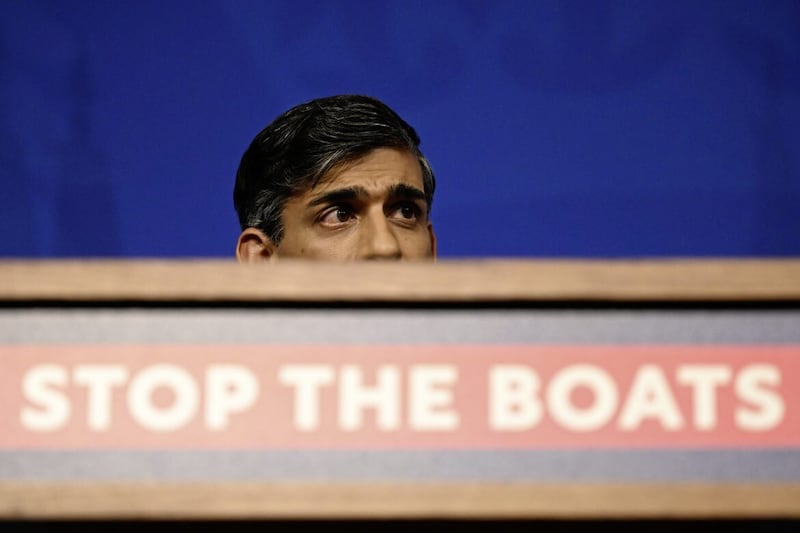There were 350 events at Féile an Phobail this year and only two of them have caused any controversy – the unveiling of a mural by the hip-hop band Kneecap ahead of their performance on Friday night and the by now annual condemnation of the concert by the Wolfe Tones which closes Féile.
But of course, the outrage machine wants to ignore those 348 other events.
In truth, the Wolfe Tones have passed their sell-by date. When the band was at its zenith in the 70s 80s and 90s, their music was a form of agitprop which memorialised people and events in songs and in stories at a time when the conflict was at its most intense and music was a way of maintaining solidarity in the community.
The majority of those chanting “ooh-ah up the ‘RA” from what I could see in the clips were mostly of an age demographic that wasn’t even alive during the worst years of the conflict and the import of the words is lost on them. Hence the importance of the other 348 Féile events, which have been so successful in changing perceptions and promoting understanding.
But Kneecap is different. What Kneecap is doing is holding up a mirror to their own community. In a media interview shared on Twitter, band member Móglaí Bap talked about Republicans they know being “the binmen and teachers in our schools and barmen – these people who were poor working-class people who wanted to join a cause, and that’s all we see. We can’t look back at that time and question the options they chose – that was a different time. But we wouldn’t advocate any violence these days. I don’t think it’s going to get us anywhere. I think there’s other options now and that’s why music and culture and language are so important to these people.”
The themes and language of the band are of the hip-hop culture, which has its roots in tackling social, political and societal issues.
And the social experience for nationalists and republicans is sadly that the PSNI is not balanced in terms of its make-up, with recruitment from the nationalist/republican community at below 25 per cent. There is a feeling at times, shared in working class communities throughout Britain and Ireland and, of course the United States, that the police are not even-handed when dealing with these communities. As well as that, the recent allegations regarding PSNI officers taking and sharing images of victims of suicide and ongoing criminal proceedings relating to misconduct in public office only further undermine confidence in the PSNI.
Art has always been used as a means of expressing resistance against the establishment, against the regime, against the state, against the oppressor.
When Kneecap hold up this mirror to their own community and are condemned for it, you have to think very carefully about where that condemnation is coming from.
In 2012, the vast majority of people in the world either didn’t know or didn’t care about Vladimir Putin’s regime in Russia. Then three members of the Russian feminist punk band Pussy Riot were arrested following a performance in a cathedral which was critical of the church and state. Two were convicted of “hooliganism motivated by religious hatred” and sentenced to two years imprisonment.
Pussy Riot, through their challenging and uncomfortable art, shone an international light on Vladimir Putin’s regime with an intensity that human rights groups had failed to achieve.
It’s not just hip-hop or punk where protests against governments are found. In 2020 the country band The Dixie Chicks dropped “Dixie” from their name because if its association with the American south during the time of slavery. They then released a song called “March March” protesting gun violence and in support of the Black Lives Matter movement. Spanning music genres, the Red Hot Chilli Peppers drummer, Chad Smith, played percussion on the song.
And let’s remember that we learned from Bono and The Edge in January this year that U2’s Sunday Bloody Sunday actually was a rebel song.
The mural of a burning PSNI land-rover unveiled by Kneecap should be seen in the artistic context in which it belongs. It doesn’t promote or advocate violence as some have suggested. Kneecap’s songs relate the experiences of their community. What is art if not a means of protest?
We should be celebrating the fact that so much of our protest has moved from the streets to the walls and the stage.
We should expect to be shocked and offended. The boundaries of art are not dictated by convention. If they were, it wouldn’t be art.
Read more: Chris Donnelly: If loyalist tunes are okay then why not republican songs? (premium)








